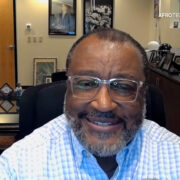Since the introduction of automation in the workplace in the 1960s there has been a fear of automation and robots taking over jobs that could be filled by humans. Now, according to to new report, millions of jobs will be out of the hands of humans and done through automation and by robots. Being that many of these jobs would be filled by Black workers, what will be the strategic response of Black America?
Research and advisory firm Forrester forecasts that automation will take 11 million — or 7 percent — of U.S. jobs by 2032. Forrester’s report, “The Future Of US Jobs, 2032: The Rise Of Human/Machine Teams,” also revealed that while automation will eliminate some jobs, it could also “reshape, and even invigorate, the U.S. job market as organizations ramp up automation deployments,” according to a press release.
Technology has increasingly taken over tasks previously performed by people. The surge in self-checkout kiosks is just one example.
The U.S. Government Accountability Office released its new report, “Workforce Automation: Insights into Skills and Training Programs for Impacted Workers,” highlighting what types of workers are most at risk of losing their jobs to automation and what skills they need to get in-demand jobs.
“Workers with lower levels of education and who perform routine tasks—think cashiers or file clerks—face the most significant risks of their jobs being automated. However, automation is likely to have widespread effects. Researchers estimate that anywhere from 9 percent to 47 percent of jobs could be automated in the future,” said GAO’s Dawn Locke, an workforce training and education expert, on the agency’s podcast.
Black workers are overrepresented in low-wage entry-level jobs and underrepresented in senior leader and executive roles, CNBC reported.
Automation should concern Black America, said Marc H. Morial, president and CEO of the National Urban League. George H. Lambert Jr. is the president and CEO of the Greater Washington Urban League.
“Black America’s collective response to emerging technology will determine whether it is an opportunity — or an existential threat,” Lambert once said.
In a opinion piece published by the Philadelphia Tribune in 2019, Morial wrote about a report by consultancy McKinsey that estimated that artificial intelligence is slated to disrupt 4.5 million jobs for African Americans, who have a 10 percent greater likelihood of automation-based job loss. This trend will negatively impact Black men without a college degree. Black women, meanwhile, will actually do better than even general white and Asian-American populations, according to the report, as reported by Business Insider.
“The National Urban League addressed these concerns in our State of Black America report, ‘Powering the Digital Revolution,’ shining a spotlight on African Americans’ underrepresentation in the kind of jobs that are least likely to be displaced by artificial intelligence. We calculated a Digital Inclusion Index — a variation on our traditional Equality Index that measures the relative economic and social status of Black Americans as compared with whites. We found a Digital Inclusion Index of 74.1 percent, with 100 representing true equality between Black and white Americans,” wrote Morial.
He said he agreed with the recommendations in the McKinsey report as to the effort the Black community should make to maintain employment.
According to the McKinsey, to avert a crisis Black Americans should make more “economic investments into high-skilled jobs in cities and markets where Blacks are currently overrepresented can directly pave a path of job stability.” It also suggested that there be initiatives by university/collegiate education to recruit and retain Black students.
“These recommendations reflect the longstanding positions of the Urban League movement,” wrote Morial. “Elected officials, business and community leaders and educational institutions must be mindful of the risk to the African-American workforce and work together to ensure that the job opportunities of the future are available to everyone.”
George H. Lambert Jr., president and CEO of the Greater Washington Urban League, http://soba.iamempowered.com/george-h-lambert-jr / An autonomous robot advises people to wear masks and keep social distance in Beijing, June 13, 2022. (AP/Andy Wong)











Comments